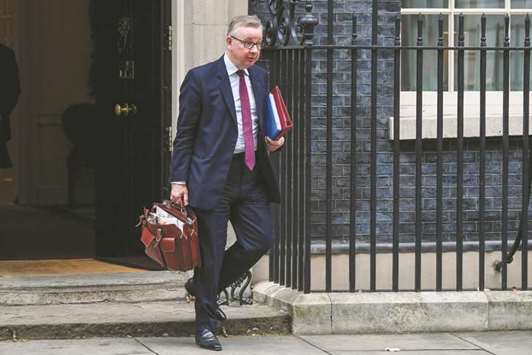The uneasy truce between the UK government and Bank of England is over.
In a speech in London on Wednesday, Environment Secretary Michael Gove, a prominent Brexit supporter and a potential successor to Prime Minister Theresa May, revived his criticism of global central banks over the fallout from monetary-policy loosening, saying they have unduly benefited the wealthy.
The remarks reignite a spat about the impact of BoE policies that has lain somewhat dormant since 2016, when governor Mark Carney was forced to defend the institution. At the time he said he wouldn’t take “instruction” from politicians and that the attacks are a “massive deflection exercise.”
A BoE spokeswoman declined to comment on Gove’s latest speech.
The broadside comes at a crucial juncture in UK politics. May is facing a major cabinet rebellion over Brexit that could destabilise her administration, while the UK Treasury is also about to start the process of finding a new BoE governor for when Carney leaves in a year.
“We’ve got people who are jockeying for position politically,” said Peter Dixon, an economist at Commerzbank AG. “It’s always very convenient to put central banks in the frame.”
Carney has long drawn criticism from pro-Brexit lawmakers for what they see as his overly gloomy take on the UK’s outlook — a spat which intensified last month when the Canadian said that the nation’s exit from the European Union has already cost UK households about £900 ($1,211) apiece.
Gove’s intervention has also been made as the issue of central bank independence remains a hot topic for investors, who in the last month have seen Turkey thrown into a currency crisis by political efforts to influence interest rates. In Italy, populist political parties hostile to the European Central Bank are forming a government, sending bond yields up.
In a conference in Stockholm last month, Federal Reserve chairman Jerome Powell said that that he and his counterparts shouldn’t take their independence for granted when trust in public institutions is at “historic lows,” while former BoE official Charles Goodhart said the past two decades of central bank independence will probably be remembered fondly by monetary policy makers.
“Quite a lot of central banks that currently have independence will probably lose it to more populist politicians,” he said. “And the rest will have more difficulty maintaining the independence they’ve had in the past 20 years.”
Gove’s speech this week didn’t explicitly mention the BoE, though it did state that a gloomier outlook for workers has coincided with a period of global policy loosening, which includes actions by the British central bank.
“Since 2008, the outlook has grown darker for most,” Gove said, citing weak productivity and wage growth and increases in unemployment. “These unfortunate trends have gone hand in hand with an increased concentration of wealth, and power, in the hands of the already wealthy and powerful,” he said.
“Loose money policies, from the European Central Bank to the US Federal Reserve, have increased the prices of assets, from real estate to equities, strengthening the economic position of the already wealthy.”
The comments echo remarks he made in 2016, when the Conservative lawmaker laid the blame for multiple economic disasters at the door of “technocrats” like the BoE Governor. In the campaign for Brexit, Gove said that people had had enough of experts.
That came at a particularly sensitive period, with the central bank under fire over its analysis of the decision to leave the European Union. Around the same time, Prime Minister Theresa May said some monetary-policy measures had bad side effects.
BoE chief economist Andy Haldane was defending the bank against charges it had fuelled inequality as recently as April. He said the emergency measures introduced in the crisis hadn’t had “significant effects on either income or wealth inequality in the UK” and said that, in the longer term, the measures had added around £1,500 ($2,000) a year to household incomes.
“Central banks have been left to get on with rescuing the economy because governments have been conspicuous by their absence,” said Commerzbank’s Dixon. They’ve “been forced to do all the heavy lifting.”

UK Environment Secretary Michael Gove leaves following a cabinet meeting at number 10 Downing Street in London. u201cLoose money policies, from the European Central Bank to the US Federal Reserve, have increased the prices of assets, from real estate to equities, strengthening the economic position of the already wealthy,u201d Gove said in his speech.
